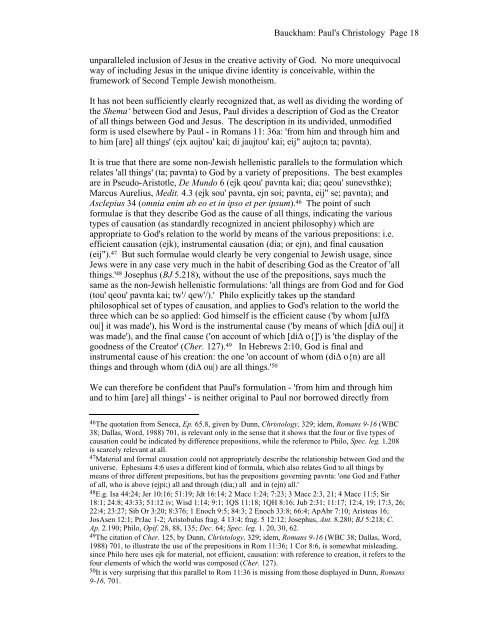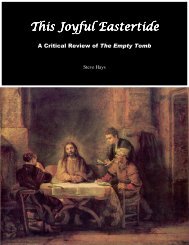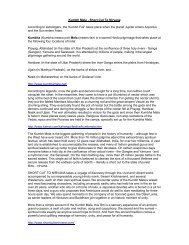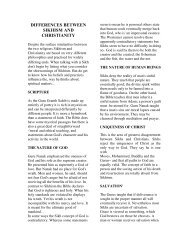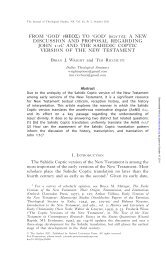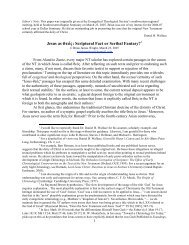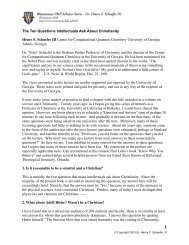Paul's Christology of Divine Identity © Richard ... - For an Answer
Paul's Christology of Divine Identity © Richard ... - For an Answer
Paul's Christology of Divine Identity © Richard ... - For an Answer
Create successful ePaper yourself
Turn your PDF publications into a flip-book with our unique Google optimized e-Paper software.
Bauckham: <strong>Paul's</strong> <strong>Christology</strong> Page 18<br />
unparalleled inclusion <strong>of</strong> Jesus in the creative activity <strong>of</strong> God. No more unequivocal<br />
way <strong>of</strong> including Jesus in the unique divine identity is conceivable, within the<br />
framework <strong>of</strong> Second Temple Jewish monotheism.<br />
It has not been sufficiently clearly recognized that, as well as dividing the wording <strong>of</strong><br />
the Shema‘ between God <strong>an</strong>d Jesus, Paul divides a description <strong>of</strong> God as the Creator<br />
<strong>of</strong> all things between God <strong>an</strong>d Jesus. The description in its undivided, unmodified<br />
form is used elsewhere by Paul - in Rom<strong>an</strong>s 11: 36a: 'from him <strong>an</strong>d through him <strong>an</strong>d<br />
to him [are] all things' (ejx aujtou' kai; di jaujtou' kai; eij" aujto;n ta; pavnta).<br />
It is true that there are some non-Jewish hellenistic parallels to the formulation which<br />
relates 'all things' (ta; pavnta) to God by a variety <strong>of</strong> prepositions. The best examples<br />
are in Pseudo-Aristotle, De Mundo 6 (ejk qeou' pavnta kai; dia; qeou' sunevsthke);<br />
Marcus Aurelius, Medit. 4.3 (ejk sou' pavnta, ejn soi; pavnta, eij" se; pavnta); <strong>an</strong>d<br />
Asclepius 34 (omnia enim ab eo et in ipso et per ipsum). 46 The point <strong>of</strong> such<br />
formulae is that they describe God as the cause <strong>of</strong> all things, indicating the various<br />
types <strong>of</strong> causation (as st<strong>an</strong>dardly recognized in <strong>an</strong>cient philosophy) which are<br />
appropriate to God's relation to the world by me<strong>an</strong>s <strong>of</strong> the various prepositions: i.e.<br />
efficient causation (ejk), instrumental causation (dia; or ejn), <strong>an</strong>d final causation<br />
(eij"). 47 But such formulae would clearly be very congenial to Jewish usage, since<br />
Jews were in <strong>an</strong>y case very much in the habit <strong>of</strong> describing God as the Creator <strong>of</strong> 'all<br />
things.' 48 Josephus (BJ 5.218), without the use <strong>of</strong> the prepositions, says much the<br />
same as the non-Jewish hellenistic formulations: 'all things are from God <strong>an</strong>d for God<br />
(tou' qeou' pavnta kai; tw'/ qew'/).' Philo explicitly takes up the st<strong>an</strong>dard<br />
philosophical set <strong>of</strong> types <strong>of</strong> causation, <strong>an</strong>d applies to God's relation to the world the<br />
three which c<strong>an</strong> be so applied: God himself is the efficient cause ('by whom [uJf∆<br />
ou|] it was made'), his Word is the instrumental cause ('by me<strong>an</strong>s <strong>of</strong> which [di∆ ou|] it<br />
was made'), <strong>an</strong>d the final cause ('on account <strong>of</strong> which [di∆ o{]') is 'the display <strong>of</strong> the<br />
goodness <strong>of</strong> the Creator' (Cher. 127). 49 In Hebrews 2:10, God is final <strong>an</strong>d<br />
instrumental cause <strong>of</strong> his creation: the one 'on account <strong>of</strong> whom (di∆ o{n) are all<br />
things <strong>an</strong>d through whom (di∆ ou|) are all things.' 50<br />
We c<strong>an</strong> therefore be confident that <strong>Paul's</strong> formulation - 'from him <strong>an</strong>d through him<br />
<strong>an</strong>d to him [are] all things' - is neither original to Paul nor borrowed directly from<br />
46 The quotation from Seneca, Ep. 65.8, given by Dunn, <strong>Christology</strong>, 329; idem, Rom<strong>an</strong>s 9-16 (WBC<br />
38; Dallas, Word, 1988) 701, is relev<strong>an</strong>t only in the sense that it shows that the four or five types <strong>of</strong><br />
causation could be indicated by difference prepositions, while the reference to Philo, Spec. leg. 1.208<br />
is scarcely relev<strong>an</strong>t at all.<br />
47 Material <strong>an</strong>d formal causation could not appropriately describe the relationship between God <strong>an</strong>d the<br />
universe. Ephesi<strong>an</strong>s 4:6 uses a different kind <strong>of</strong> formula, which also relates God to all things by<br />
me<strong>an</strong>s <strong>of</strong> three different prepositions, but has the prepositions governing pavnta: 'one God <strong>an</strong>d Father<br />
<strong>of</strong> all, who is above (ejpi;) all <strong>an</strong>d through (dia;) all <strong>an</strong>d in (ejn) all.'<br />
48 E.g. Isa 44:24; Jer 10:16; 51:19; Jdt 16:14; 2 Macc 1:24; 7:23; 3 Macc 2:3, 21; 4 Macc 11:5; Sir<br />
18:1; 24:8; 43:33; 51:12 iv; Wisd 1:14; 9:1; 1QS 11:18; 1QH 8:16; Jub 2:31; 11:17; 12:4, 19; 17:3, 26;<br />
22:4; 23:27; Sib Or 3:20; 8:376; 1 Enoch 9:5; 84:3; 2 Enoch 33:8; 66:4; ApAbr 7:10; Aristeas 16;<br />
JosAsen 12:1; PrJac 1-2; Aristobulus frag. 4 13:4; frag. 5 12:12; Josephus, Ant. 8.280; BJ 5:218; C.<br />
Ap. 2.190; Philo, Opif. 28, 88, 135; Dec. 64; Spec. leg. 1. 20, 30, 62.<br />
49 The citation <strong>of</strong> Cher. 125, by Dunn, <strong>Christology</strong>, 329; idem, Rom<strong>an</strong>s 9-16 (WBC 38; Dallas, Word,<br />
1988) 701, to illustrate the use <strong>of</strong> the prepositions in Rom 11:36; 1 Cor 8:6, is somewhat misleading,<br />
since Philo here uses ejk for material, not efficient, causation: with reference to creation, it refers to the<br />
four elements <strong>of</strong> which the world was composed (Cher. 127).<br />
50 It is very surprising that this parallel to Rom 11:36 is missing from those displayed in Dunn, Rom<strong>an</strong>s<br />
9-16, 701.


